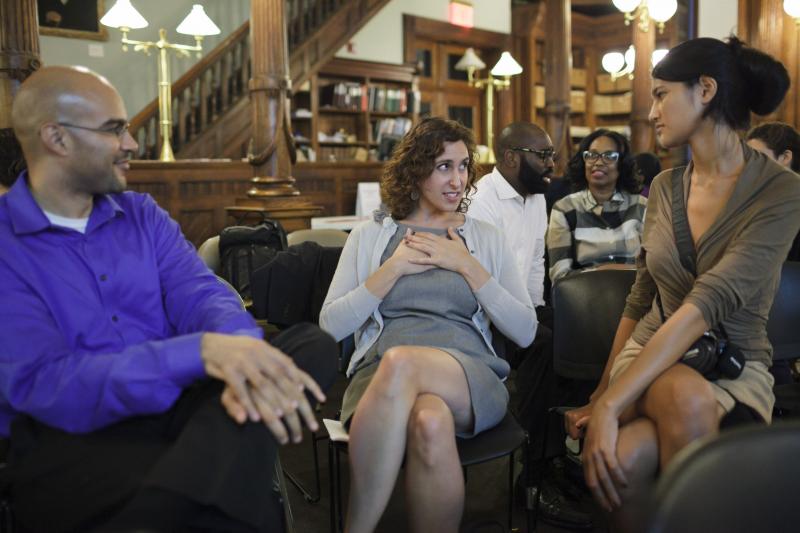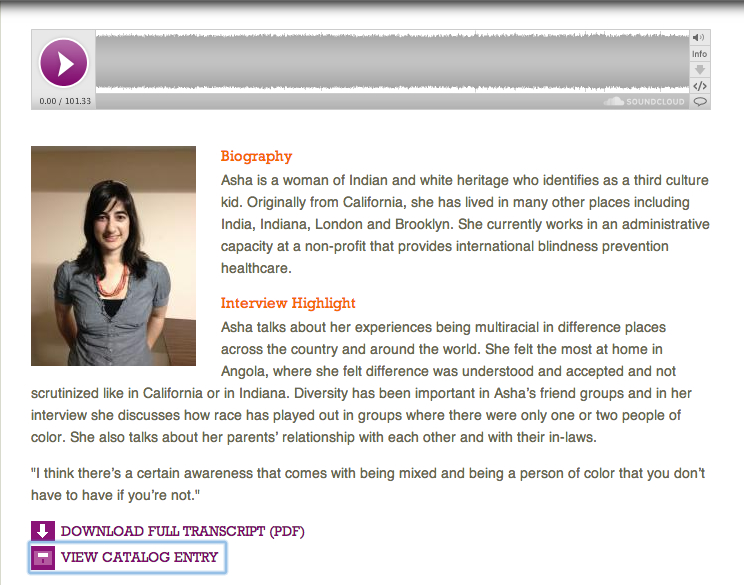- About Archives
- About SAA
- Careers
- Education
- Publications
- Advocacy
- Membership
 Search engine optimization (SEO), or Google find-ability, is a goal for most websites, particularly digital humanities sites that bring archival collections to light online. We want people to discover our sites and explore our collections.
Search engine optimization (SEO), or Google find-ability, is a goal for most websites, particularly digital humanities sites that bring archival collections to light online. We want people to discover our sites and explore our collections.
So, when BHS began developing a digital humanities site for a new project, Crossing Borders, Bridging Generations (CBBG), which would include online access to an oral history collection, we of course wanted the site to be Google findable.
CBBG is an oral history project and public programming series that examines the history and experiences of mixed-heritage people and families, cultural hybridity, race, ethnicity, and identity in the historically diverse borough of Brooklyn. CBBG builds upon BHS's oral history collections. Begun in 1973, the oral history collections contain interviews with more than 1,200 narrators and are available for listening in the Othmer Library.
Whenever possible, BHS gives researchers access to the audio/video of the interview, not just the transcript, because voice contains so much information that cannot be translated into text. But oral history interviews can be long (1 - 3 hours, multiple sessions) and we have found that many researchers do not want to sit and listen for that long in the reading room. Most researchers request copies of the interviews so that they can listen at home. Because of the frequency of this request, as well as national and international interest in the collections, BHS has long been eager to provide online access to the oral history collections. Thanks to NEH and IMLS, the CBBG oral history collection-in-progress is BHS's first collection to be shared in full (audio/video/transcript) online.
 And we just learned an important lesson:
And we just learned an important lesson:
Contemporary narrators prefer that their oral history interviews not be Google findable.
Over 80 people, who self-identify as mixed-heritage people or families, have shared personal stories of life, love, family, work, faith, and community. These stories are a valuable way to understand the complexities of culture and identity over time, including how laws and social mores effect our private lives.
Many narrators, who were happy at first to share their oral histories via the online collection, changed their minds after they realized that anyone who Googled the narrator's name (such as prospective employers and distant family) would come across this hours-long personal interview.
To honor narrators' desire for more privacy, while at the same time keeping the collection open and accessible (a goal narrators also shared), BHS made the decision to hide the online oral history archive from search engine "spiders" (indexers). The majority of the site is still "crawled" by spiders and therefore Google findable, but now when people search for a narrator's name, their CBBG oral history interview page will not pop up in the results.
BHS was inspired by Ryan Barland, oral historian at Minnesota Historical Society, who decided to make their 1,600 online oral histories searchable from the MNHS website only, not via search engines like Google.
Going forward, BHS will be indexing CBBG interviews using OHMS, the fantastic Oral History Metadata Synchronizer. The OHMS Player will provide even greater accessibility to this oral history collection, as people will be able to explore individual interviews by themes and keyword searches. But no one will stumble across these interviews online.
Image 1: Participants in the 2nd Annual What Are You? discussion about mixed heritage.
Photo by Willie Davis for Brooklyn Historical Society, 2012
Image 2: Screenshot of one narrator's CBBG Oral History page
<< Previous: Keeping Stories: Archiving Stories in Troubled Times | Dialogue: Winter 2014 | Next: Oral History and Folklife Research, Inc. Announces Formation of New Nonprofit >>
Navigating the complexities of privacy and academic freedom in oral history projects is indeed challenging. While it's crucial to protect the identities and personal information of participants, it's equally important to ensure that researchers have access to the necessary tools for their work. In this context, platforms like Peoplesmart reviews can be valuable for verifying the identities of individuals involved in oral history projects. However, it's essential to approach such tools with caution, ensuring that their use complies with ethical guidelines and legal standards. Always prioritize the privacy and consent of your participants when utilizing any information-gathering resources.